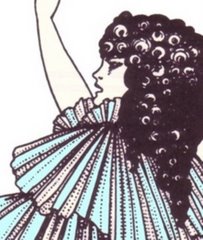News fom Chengdu
BOOK LAUNCH March 5, 2008: GRENDEL’S POND
GRENDEL’S POND is the fourth in a series of small chapbooks comprised of selections from THE CITY OF WORDS, an epic work of more than 5,000 individual texts. There are 38 texts in Grendel’s Pond: there are poems, prose pieces, and pieces of writing which do not fit easily into any categorical genre. I call all the works ‘texts’ for the very simple reason that any piece of writing is literally a text, and there are many varieties of verbal expression in THE CITY OF WORDS. It is the writing itself, the language, that is the important part, not the category!
Grendel is a monster in the early English epic BEOWULF, the fiend whom Beowulf fights and kills. Grendel lives underwater in a fen or boggy pool, into which Beowulf plunges in pursuit of the monster. Their battle occurs underwater in this pool. The title refers to the choices a poet must make in pursuing his craft. While it’s convenient to think of the pond as a symbol of the Unconscious (personal and collective), I also have in mind the ordinary external world, whose surfaces must be plumbed to get at any kind of truth. There are plenty of monsters in both places. The poet here is seen as someone actively engaged in conflict, not a mere commentator on or describer of events. This engagement is largely invisible, just as Beowulf is fighting unseen by human eyes. The most valid poetry comes from the depths, and anyone seriously engaged in the effort to create poetry is entitled to a share of the epithet ‘heroic.’ Beowulf succeeds in slaying Grendel, and re-emerges from the pond, having freed the inhabitants of that area from terror and suffering. Successful poetry also liberates us, the readers, if only by reminding us of a larger, more heroic world than that of ‘the daily grind.’
Robert Bly’s very perceptive book IRON JOHN is a kind of echo of Beowulf, in that Iron John is discovered living at the bottom of a pond.
He is brought to the surface by a less dramatic hero than Beowulf but still a very effective one. Iron John is immediately imprisoned in the local town, but eventually escapes, helped by the young son of the King. Ultimately Iron John reappears as a “Lord of Life’, having emerged from a kind of enchantment that had imprisoned him in the pond. This is a primary aim of poetry itself: to wake the reader from the drowsy humdrum repetitive rounds of everyday existence into a sudden awareness of a world one does not usually see or think about but which is there all the time. The poet shares the same world we do, but he or she lives in it differently, beneath the surfaces most of us take for granted, and because of this ceaseless interactive struggle “in the depths,” poems emerge with the power to propel us, even if only for a moment or two, into that more real place we usually describe as ‘dreamland.’ The Poet’s dream is the dream of the Real, and the poet’s touch wakes each of us into a world of the ‘really Real’ . These vivid moments enable us to return to our ordinary tasks and involvements with a fresh sense of ourselves, and a more productive, satisfying relation to all those around us. Poetry places us in touch with a larger feeling of both self and world. It is in that sense I find it a ‘heroic’ human action.
Grendel’s Pond is dedicated to a close friend of mine, who lives in Montreal, Canada. We met in 1983. I was hosting a weekly poetry reading series, at an art gallery. Brian was a scheduled reader for a Saturday night in late October. He arrived on time but alas, the weather was cold, wet and windy, it was a Saturday night and no one else came by! Brian and I spent a couple of hours talking, and I re-scheduled him for a later date, that proved much more successful. This is an example of the many disappointments any poet is in for, in seeking connections with the ordinary world. The poet soon learns to accept the loneliness of the poetic effort. It was Brian who, several years later, introduced me to Robert Bly’s IRON JOHN, on a trip we made to New York City, where among other things we attended a poetry reading in an apartment in Greenwich Village. Our own poems were well received by the people gathered there, all of whom were very creditable poets themselves, though unknown to the public at large. This, too, is part of the loneliness of the poet’s life.
Best wishes to all readers of GRENDEL’S POND! May each of you find in it a gleam or two of the ‘really Real.’
Allen Sutterfield
Subscribe to:
Post Comments (Atom)



No comments:
Post a Comment